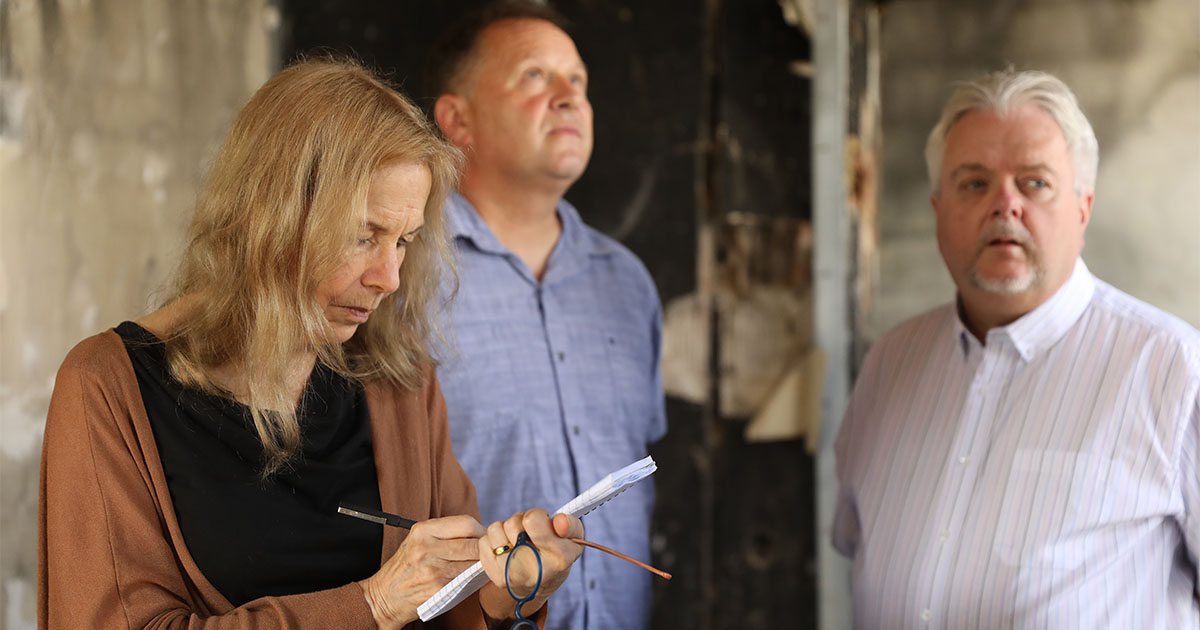SU's Polkinghorn Steps in to Assist Ukrainian Humanitarian Effort with Perdue
SALISBURY, MD---Amid the atrocities reported daily in the war between Russia and Ukraine, one ongoing horror often fails to make the news: human trafficking.
At the request of the Ukrainian government, two members of Salisbury University’s Bosserman Center for Conflict Resolution have spent the past year working to aid those affected by this heinous crime.
Last summer, Dr. Brian Polkinghorn, the center’s executive director, and Mitzi Perdue, a senior fellow at the center, traveled to Ukraine on a fact-finding mission to determine how and where they could help. SU Alumnus Gary McGill, whose company, McGill Solutions Ltd., is based outside of London, played a large part in the logistics of the trip and information gathering.
Perdue, a longtime ally in the fight against human trafficking, hoped the mission would enable her to tell the story of what truly is happening on the ground as a journalist.
With the information he gathered, Polkinghorn was able to use the Bosserman Center’s connections as the home of United Nations Regional Centre for Expertise (RCE) Salisbury to begin creating safe spaces throughout the country for women and children who may be targeted by Russian militants for trafficking.
“You’re doing what you’re supposed to do,” said Polkinghorn. “This is a purpose-driven life. If you know you can help, how do you not step up and get involved?”
While the military incursion wages on, Polkinghorn and Perdue find it important to provide life-changing, non-military civilian humanitarian aid.
Polkinghorn pointed to the hundreds of thousands of missing children from eastern Ukraine as a humanitarian crisis that they can lend a hand in combatting. The work they are spearheading allows for construction projects to refurbished damaged buildings to create shelters, or safe houses, for women and children.
“Some buildings are ruined, but there are structures that are slightly damaged and, with some work, are usable for shelters,” he said. “They are located in places throughout the country safe from traffickers.”
These locations range from small houses, which can hold as many as 25 women and children, to large buildings with 40 or more rooms.
RCE Salisbury and the Bosserman Center have a long history of collaboration in construction domestically and abroad, including in conflict areas – Polkinghorn’s visits to Ukraine mark the fifth theater of war he’s worked in – and that experience has helped with the current project.
Construction companies and experts are volunteering their expertise and time to coordinate projects in Ukraine, saving millions of dollars, he said.
Financing for the projects has come from a number of sources. U.S. government entities joined the initiative after Polkinghorn and Perdue presented findings to multiple congressional investigators and subcommittees.
Perdue was so moved, she pledged her own funds to the project. She sold a family heirloom – a ring, featuring a 5.75 carat emerald, from the historic Nuestra Señora de Atocha shipwreck. It was auctioned off at Sotheby’s and resulted in a $1.197 million sale, with all proceeds benefiting humanitarian aid in Ukraine.
While Polkinghorn and Perdue are the only SU community members involved with the project in its current form, students from the Bosserman Center and across campus have shown interest in helping. (Civic engagement long has been a pillar of an SU education, Polkinghorn noted.)
Discussions also are underway for an SU drive to collect or purchase large capacity batteries, portable generators and solar panels – due to widespread blackouts - and other critical items such as field combat blood transfusion kits to be sent to the affected areas.
For more information about the Bosserman Center and its initiatives, visit the Bosserman Center website.
Learn more about opportunities to Make Tomorrow Yours at the SU website.

